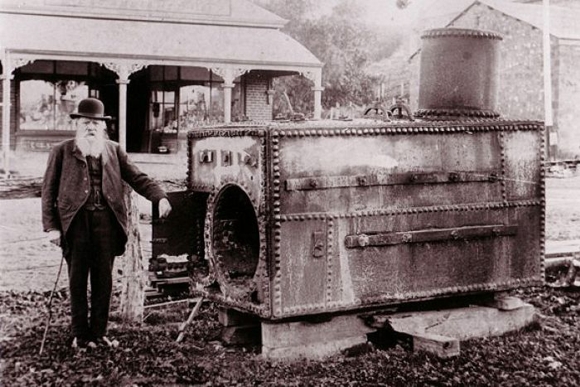Genealogy Close Calls
I was inspired to write this post as a result of reading Heather Rojo’s blog, Nutfield Genealogy, when wrote about her “Top Ten Genealogy Close Calls“.
The title alone intrigued me, as I wasn’t quite sure what she meant by ‘genealogy close call’. But she explains it well:
“What’s a “Genealogy Close Call”? It happens when I research an ancestor and realize that if fate didn’t intervene I wouldn’t be here today. Some of our ancestors narrowly escaped disasters, only to live on and produce a descendant that led to YOU. “
So that got me thinking. Did I have any “genealogy close calls”. My initial thoughts were no, but as the day progressed I remembered the following incidents:
MY GENEALOGY CLOSE CALLS
WILLIAM KENNARD ELPHICK (c1815-1869) – Survived the voyage
and wife SUSANNA ELPHICK (nee ELLIOT) (c1812-1899)
William and his wife Susanna married in London in November 1838, and then immediately boarded the ‘Plantar’ ship to start a new life in Australia. The journey which on average takes about four months, took almost six months partly due to the captain’s incompetence – missing a port where they were meant to collect supplies, and having to stop elsewhere as a result, together with other misadventures such which included much of the crew being lost, as were some passengers and most of the livestock. Eventually a new crew was acquired and the journey continued. For more on their story click here. The Elphick family settled in Adelaide, and had numerous children. The Elphick’s are Mr Lonetester’s 3x great grandparents. While not everyone survived this journey, they did, and if they hadn’t he wouldn’t have be here.
OTTO RAFAEL WINTER (1880-1961) – WW1 injuries
Otto Winter was born in Finland and spent 7 years sailing the world on a merchant sailing ship. I’m sure if I had detailed of every voyage there would be ‘close call’ stories there, but I don’t, so I won’t make assumptions. After having jumped ship in Australia, he chose to get naturalised and in 1916 he signed up for the Australian Army in WW1 and was sent off to Belgium. During his three years in the AIF he was wounded several times, including being shot in the stomach and poisoned with mustard gas while tunnelling at Ypres. Despite this, he survived and made it home to his young wife and baby boy. Had he not survived my grandma would not have been born. For more on Otto Winter click here.
————————
GENEALOGY CLOSE CALLS, BUT NOT CLOSE ENOUGH
ISAAC RICHARDSON (1804-1873) – sentenced to death
A labourer in Kent, Isaac Richardson together with his bother Simeon, were rioting to stand up for their rights during the Industrial Revolution. Sentenced to death, the local townspeople petitioned to save their life and both were then sentenced to transported to Van Diemen’s Land for life instead. Isaac’s wife Matilda (nee Bonner) and the two children Edward and Esther were given assisted passage in 1837-38. Isaac was granted a conditional pardon in 1842. Isaac and Matilda had a total of 9 children, and continued to live in Tasmania. Isaac’s first born child, Edward was my 3x great grandpa). As Edward was already born before Isaac was transported, this doesn’t count as a ‘close call’ for me, but for descendants of the 7 children that were born later it certainly would. You can read more about Issac Richardson here.
WILLIAM RICHARD RANDELL (1824-1911) – near explosion
William Richard Randell is known as the father of paddlesteamers on the River Murray. He emigrated with his parents from Devon, England in 1837 and initially they bred cattle and drove them along the land along the Murray River, in South Australia and later setup flour mills in the Adelaide Hills. Despite having no previous experience in navigation or having ever seen a steamboat, W.R. Randell became obsessed with building a paddlesteamer to transport supplies up and down the river. And by 1853 the “Mary Ann” which he built became the first paddlesteamer in South Australia. The boiler, a box shape, and made of lead riveted together was said to have “needed chains wrapped around the middle. Even then when proceeding at maximum speed the sides and top were observed to swell in and out like a concertina”. And while it didn’t explode, but it seems like it wasn’t far from it. William Richard Randell is a half-brother to my 2x great grandpa … so he’s not a direct relative. But had he not survived his paddlesteaming days, it certainly would affected his direct line.
GEORGE PHILLIPS (1865-1941) – nearly drowned
There’s a story that’s been handed down the generations in my family about George Phillips. George Phillips and his wife Mary Ann (nee Kemp), along with their baby boy, also George, emigrated from England to South Australia in 1865 onboard the “Adamant”. The story goes that a fellow female passenger was holding baby George, when Mary Ann had a bad feeling or premonition, so she collected him from the lady, and shortly afterwards that poor lady fell overboard. I don’t know the validity of the story, except that there was a lady who drowned on the voyage out mentioned in the surgeon’s journals. So it is a possibility. And as baby George survived, he counts as a genealogy close call, although not for me, as he’s a brother to my great great grandpa, not my direct line.
————————
While I don’t have many ‘close calls’ in this list. Ok technically only two, this just means that I have more research to do. More digging to find the stories.
Just think of all the possibilities there are, past and present: car accidents, horse and cart accidents, farm accidents, mining accidents, fires in the house, other occupational accidents, childbirth, fell down steps, numerous diseases and ailments, natural disasters (fires, floods, famine, tornado, cyclone, hurricane), major sporting injuries, a close encounter with a wild animal, or was your ancestor known for getting in fights? The list is endless …
Now I’m off to see what else I can find …






Hi Alona
I have a near miss story!
My great great paternal grandfather, James Remnant, travelled from Fittleworth, West Sussex, to London-presumably looking for work. Here he met my great great grandmother, Mahala smith, who had come from Faversham in Kent. She also was probably looking for work. (Mahala strangely changed her name to Rosetta Smith and married using that name).
The young couple married 3 November 1866. London, at that time, was rife with Smallpox and James succumbed to the disease a few months after they wed and died, aged 21, 28 Feb 1867. He was buried by the Poplar Workhouse. Mahala had become pregnant and returned to Kent to have her baby 19 Aug 1867. He was born 9 months and 16 days after they married. Mahala christened her baby James Henry Remnant, after his father.
Mahala 21, married again, 1st Nov 1868, in Kent, 2 years after her first marriage.
Richard Tester, 22, was a stonemason. He and Mahala had more children and the family moved to Adelaide, SA in 1876.
James Henry Remnant, often used his stepfather’s name of Richard Tester. Indeed, James Henry Remnant/Tester was a trouble to the SA police. He was a brawler and a drunkard. He never married but had 9 illegitimate children to a young prostitute named Margaret Thompson, and after he beat her, he left her and the children, without ever paying her maintenance. Five of the children had been removed by the Sate and fostered out.
One of the fostered children, his third child, he named Richard John Tester, after his stepfather. Richard John was my grandfather.
Richard John followed in his father’s footsteps to some lesser extent. He had 4 children then left his wife and skipped the state without paying maintenance. Richard John Tester named his first son Richard William Tester. He was my father, a good man who broke the pattern and cared for his family. He married my Mother, Burl Kerslake and they had four children. The eldest, my brother, was named Richard Mervin Tester.
Eventually, I became absorbed in searching out my family history. It took many years to find out the truth- that my surname was never Tester, but Remnant! The name Richard Tester, no blood relation, was originally that of my Great Great grandmother’s second husband. I suspect that several generations were quite unaware of the switch and If I hadn’t determinedly fossicked for years, I would never have known that I was a Remnant descendant and not a Tester.
It also dawned on me, that if Mahala hadn’t become pregnant immediately after the marriage to James, I would not be here.
story by Glenice Ellen Gare nee Tester.
omg! this helped me so much, im researching Ruby Ellen Tester and had no idea about all this! Thank you so much for sharing your story. Ruby is my Great Grandmother.
I love this topic Alona! I’m now off to study all the gruesome things that happened to my ancestors. 🙂